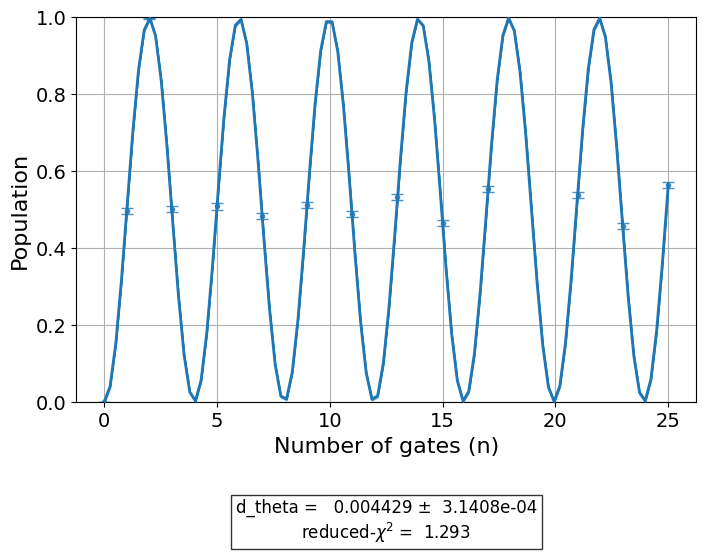FineSXAmplitude¶
- class FineSXAmplitude(physical_qubits, backend=None)[source]¶
A fine amplitude experiment with all the options set for the \(\pi/2\)-rotation.
Overview
FineSXAmplitudeis a subclass ofFineAmplitudeand is used to set the appropriate values for the default options.Analysis class reference
Experiment options
These options can be set by the
set_experiment_options()method.- Options
Defined in the class
FineSXAmplitude:gate (Gate)
Default value: Instance ofSXGateFineSXAmplitude calibrates an SXGate.add_cal_circuits (bool)
Default value:FalseIf set to True then two circuits to calibrate 0 and 1 points will be added. This option is set to False by default forFineSXAmplitudesince the amplitude calibration can be achieved with two SX gates and this is included in the repetitions.repetitions (List[int])
Default value: [0,1,2,3,5, …]By default the repetitions take on odd numbers for \(\pi/2\) target angles as this ideally prepares states on the equator of the Bloch sphere. Note that the repetitions include two repetitions which plays the same role as including a circuit with an X gate.
Defined in the class
FineAmplitude:normalization (bool)
Default value:TrueIf set to True the DataProcessor will normalized the measured signal to the interval [0, 1]. Defaults to True.
Defined in the class
BaseExperiment:max_circuits (Optional[int])
Default value:NoneThe maximum number of circuits per job when running an experiment on a backend.
Example
from qiskit_experiments.library import FineSXAmplitude exp = FineSXAmplitude(physical_qubits=(0,), backend=backend) exp_data = exp.run().block_for_results() display(exp_data.figure(0)) exp_data.analysis_results(dataframe=True)

name experiment components value quality backend run_time chisq 5050c1c7 d_theta FineSXAmplitude [Q0] 0.0504+/-0.0007 good aer_simulator None 1.00835 See also
Initialization
Initialize the experiment.
Attributes
- analysis¶
Return the analysis instance for the experiment
- backend¶
Return the backend for the experiment
- experiment_options¶
Return the options for the experiment.
- experiment_type¶
Return experiment type.
- num_qubits¶
Return the number of qubits for the experiment.
- physical_qubits¶
Return the device qubits for the experiment.
Methods
- circuits()¶
Create the circuits for the fine amplitude calibration experiment.
- Returns:
A list of circuits with a variable number of gates.
- Return type:
List[QuantumCircuit]
- config()¶
Return the config dataclass for this experiment
- Return type:
- copy()¶
Return a copy of the experiment
- Return type:
- classmethod from_config(config)¶
Initialize an experiment from experiment config
- Return type:
- job_info(backend=None)¶
Get information about job distribution for the experiment on a specific backend.
- Parameters:
backend (Backend) – Optional, the backend for which to get job distribution information. If not specified, the experiment must already have a set backend.
- Returns:
A dictionary containing information about job distribution.
”Total number of circuits in the experiment”: Total number of circuits in the experiment.
”Maximum number of circuits per job”: Maximum number of circuits in one job based on backend and experiment settings.
”Total number of jobs”: Number of jobs needed to run this experiment on the currently set backend.
- Return type:
dict
- Raises:
QiskitError – if backend is not specified.
- run(backend=None, sampler=None, analysis='default', timeout=None, backend_run=None, **run_options)¶
Run an experiment and perform analysis.
- Parameters:
backend (Backend | None) – Optional, the backend to run on. Will override existing backend settings.
sampler (BaseSamplerV2 | None) – Optional, the sampler to run the experiment on. If None then a sampler will be invoked from previously set backend
analysis (BaseAnalysis | None) – Optional, a custom analysis instance to use for performing analysis. If None analysis will not be run. If
"default"the experimentsanalysis()instance will be used if it contains one.timeout (float | None) – Time to wait for experiment jobs to finish running before cancelling.
backend_run (bool | None) – Use backend run (temp option for testing)
run_options – backend runtime options used for circuit execution.
- Returns:
The experiment data object.
- Raises:
QiskitError – If experiment is run with an incompatible existing ExperimentData container.
- Return type:
- set_experiment_options(**fields)¶
Set the experiment options.
- Parameters:
fields – The fields to update the options
- Raises:
AttributeError – If the field passed in is not a supported options
- set_run_options(**fields)¶
Set options values for the experiment
run()method.- Parameters:
fields – The fields to update the options
See also
The Setting options for your experiment guide for code example.
- set_transpile_options(**fields)¶
Set the transpiler options for
run()method.- Parameters:
fields – The fields to update the options
- Raises:
QiskitError – If initial_layout is one of the fields.
See also
The Setting options for your experiment guide for code example.